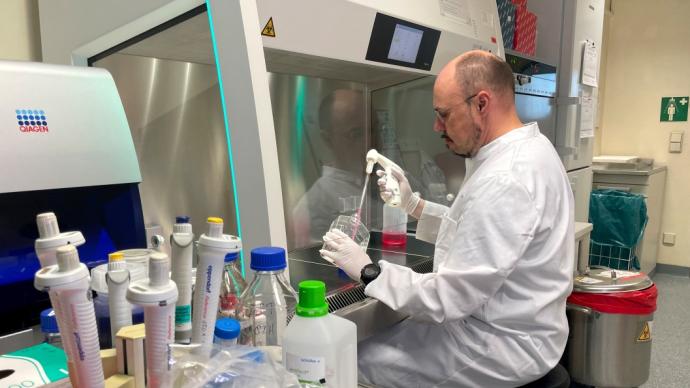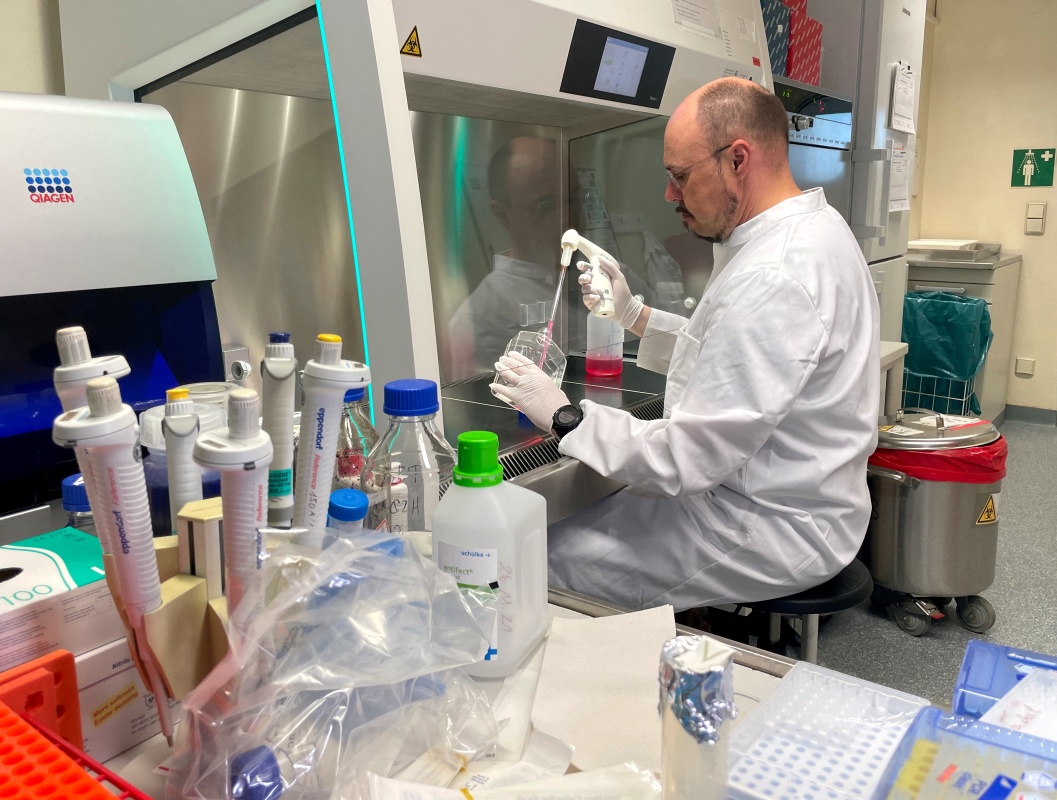
The latest data from the World Health Organization shows that since May 13, 12 non-monkeypox virus-endemic countries have reported cases of monkeypox virus infection to WHO, with 92 confirmed cases and 28 suspected cases. Human-to-human transmission of monkeypox virus is taking place, and monkeypox patients are contagious when they develop symptoms, usually lasting 2-4 weeks. It is unclear whether asymptomatic infected individuals are contagious. 
Will monkeypox virus be the next "smallpox"? Guo Wei, deputy director of the Department of Infectious Diseases at Tongji Hospital of Huazhong University of Science and Technology, told reporters on May 23 that the monkeypox virus may not cause the next pandemic outbreak, but it should be taken seriously in response. No matter what kind of infectious disease, whether it can be effectively dealt with depends on the most classic "three axes" - controlling the source of infection, cutting off the transmission route, and protecting the susceptible population to what extent.
Controlling the source of infection: Beware of groundhogs
"In the United States, there are cases where groundhogs were infected with monkeypox virus. It can be said that rodents are the main source of infection of monkeypox virus." Guo Wei said that the reason why smallpox can be eliminated is not only because the vaccine is effective, but also because of the Humans are its only host, no other host animals. Unlike monkeypox virus, it has multiple host animals, so in terms of controlling the source of infection, in addition to considering social transmission, it is necessary to be vigilant in contact with rodents.
In terms of the source of infection, Guo Wei said that in addition to preventing infection caused by contact with people, it is also necessary to prevent infection caused by contact with animals .
"Although monkeypox virus is called monkeypox virus, its intermediate host is not just monkeys." Guo Wei reminded that its name is due to the fact that it was first discovered in monkeys, but many rodents carry this virus.
Therefore, those returning from sojourning in endemic areas should still pay attention to their symptoms, report to health professionals if necessary, and conduct necessary isolation. The reporter learned that relevant units have begun to involve relevant detection kits based on the sequence of the monkeypox virus for the discovery and investigation of the source of infection.
Cut the spread: 'Have a cup of coffee' is not a big deal
"The new coronavirus and smallpox virus are transmitted through the respiratory tract. The currently reported cases show that the monkeypox virus is mostly transmitted through close contact between people." Guo Wei said that this mode of transmission means that "cutting the transmission route" is easier to control. It also means that for the general public, avoiding very close contact with infected people can prevent them from being violated by the virus.
In fact, a cup of coffee and a dinner are not within the scope of intimate contact. This is related to how the virus is infected. Guo Wei explained that the monkeypox virus needs to enter the blood of the human body first, and invade cells in the human body through the blood, so the transmission through mucosal contact is its main mode of transmission. The new coronavirus is different. It directly binds to specific receptors on respiratory cells to invade cells, reproduce, detoxify, and then spread. Therefore, it mainly spreads through the respiratory tract.
The WHO website suggests that monkeypox virus may resemble some sexually transmitted diseases such as herpes and syphilis, which could explain why most cases are detected in sexual health clinics. Most monkeypox cases are currently found among men who have sex with men, but community transmission cannot be ruled out. In addition to sexual behavior, it is possible to contract monkeypox virus through oral ulcers, contact with patient's body fluids, and infected clothes.
Immune protection: Smallpox vaccine is 85% effective
Monkeypox virus and smallpox virus belong to the same genus. According to clinical research data, the effective rate of smallpox vaccine against monkeypox virus reaches 85%.
So, is there no need to research a new monkeypox vaccine? Are people who were previously vaccinated against smallpox immune to the monkeypox virus?
"New vaccines can still be developed. After all, the smallpox vaccine was not developed specifically for monkeypox vaccines. Before the monkeypox vaccine was developed, if there was a certain scale of epidemic, the smallpox vaccine was administered to produce antibodies, which would also be effective against monkeypox virus. It must be preventive." Guo Wei said.
"People born in the 1960s and 1970s will have a flower scar on their arm that is the size of a broad bean, which is left by the smallpox vaccine." Guo Wei explained that in theory, it is enough to be vaccinated once in a lifetime, but with the As the age increases and the time prolongs, the antibodies in the human body will also decline. If there is an epidemic, it also needs to be vaccinated. Since the smallpox vaccine has not been vaccinated in my country since the 1980s, people under the age of 40 are generally not immune to monkeypox virus. If it becomes popular, vaccination is still required.
"Generally speaking, monkeypox virus infection is a self-limiting disease. Even if there is no vaccination and no specific antibodies in the body, there are non-specific immune responses in the human body, such as macrophages, which can eliminate monkeypox virus. Most of the cells infected by the virus can recover in 2-4 weeks without excessive panic." Guo Wei said.

Researchers work in a laboratory in Munich, Germany, after a confirmed case of monkeypox was reported in Germany on May 20. Xinhua News Agency
Since both monkeypox and smallpox have "pox" in their names, the human body will produce blisters when they are sick, and both belong to the genus Orthopox. Many people worry about whether the further spread of monkeypox virus will bring Risk of mass infection.Will monkeypox virus be the next "smallpox"? Guo Wei, deputy director of the Department of Infectious Diseases at Tongji Hospital of Huazhong University of Science and Technology, told reporters on May 23 that the monkeypox virus may not cause the next pandemic outbreak, but it should be taken seriously in response. No matter what kind of infectious disease, whether it can be effectively dealt with depends on the most classic "three axes" - controlling the source of infection, cutting off the transmission route, and protecting the susceptible population to what extent.
Controlling the source of infection: Beware of groundhogs
"In the United States, there are cases where groundhogs were infected with monkeypox virus. It can be said that rodents are the main source of infection of monkeypox virus." Guo Wei said that the reason why smallpox can be eliminated is not only because the vaccine is effective, but also because of the Humans are its only host, no other host animals. Unlike monkeypox virus, it has multiple host animals, so in terms of controlling the source of infection, in addition to considering social transmission, it is necessary to be vigilant in contact with rodents.
In terms of the source of infection, Guo Wei said that in addition to preventing infection caused by contact with people, it is also necessary to prevent infection caused by contact with animals .
"Although monkeypox virus is called monkeypox virus, its intermediate host is not just monkeys." Guo Wei reminded that its name is due to the fact that it was first discovered in monkeys, but many rodents carry this virus.
Therefore, those returning from sojourning in endemic areas should still pay attention to their symptoms, report to health professionals if necessary, and conduct necessary isolation. The reporter learned that relevant units have begun to involve relevant detection kits based on the sequence of the monkeypox virus for the discovery and investigation of the source of infection.
Cut the spread: 'Have a cup of coffee' is not a big deal
"The new coronavirus and smallpox virus are transmitted through the respiratory tract. The currently reported cases show that the monkeypox virus is mostly transmitted through close contact between people." Guo Wei said that this mode of transmission means that "cutting the transmission route" is easier to control. It also means that for the general public, avoiding very close contact with infected people can prevent them from being violated by the virus.
In fact, a cup of coffee and a dinner are not within the scope of intimate contact. This is related to how the virus is infected. Guo Wei explained that the monkeypox virus needs to enter the blood of the human body first, and invade cells in the human body through the blood, so the transmission through mucosal contact is its main mode of transmission. The new coronavirus is different. It directly binds to specific receptors on respiratory cells to invade cells, reproduce, detoxify, and then spread. Therefore, it mainly spreads through the respiratory tract.
The WHO website suggests that monkeypox virus may resemble some sexually transmitted diseases such as herpes and syphilis, which could explain why most cases are detected in sexual health clinics. Most monkeypox cases are currently found among men who have sex with men, but community transmission cannot be ruled out. In addition to sexual behavior, it is possible to contract monkeypox virus through oral ulcers, contact with patient's body fluids, and infected clothes.
Immune protection: Smallpox vaccine is 85% effective
Monkeypox virus and smallpox virus belong to the same genus. According to clinical research data, the effective rate of smallpox vaccine against monkeypox virus reaches 85%.
So, is there no need to research a new monkeypox vaccine? Are people who were previously vaccinated against smallpox immune to the monkeypox virus?
"New vaccines can still be developed. After all, the smallpox vaccine was not developed specifically for monkeypox vaccines. Before the monkeypox vaccine was developed, if there was a certain scale of epidemic, the smallpox vaccine was administered to produce antibodies, which would also be effective against monkeypox virus. It must be preventive." Guo Wei said.
"People born in the 1960s and 1970s will have a flower scar on their arm that is the size of a broad bean, which is left by the smallpox vaccine." Guo Wei explained that in theory, it is enough to be vaccinated once in a lifetime, but with the As the age increases and the time prolongs, the antibodies in the human body will also decline. If there is an epidemic, it also needs to be vaccinated. Since the smallpox vaccine has not been vaccinated in my country since the 1980s, people under the age of 40 are generally not immune to monkeypox virus. If it becomes popular, vaccination is still required.
"Generally speaking, monkeypox virus infection is a self-limiting disease. Even if there is no vaccination and no specific antibodies in the body, there are non-specific immune responses in the human body, such as macrophages, which can eliminate monkeypox virus. Most of the cells infected by the virus can recover in 2-4 weeks without excessive panic." Guo Wei said.
Related Posts
0 Comments
Write A Comments